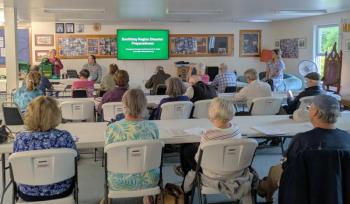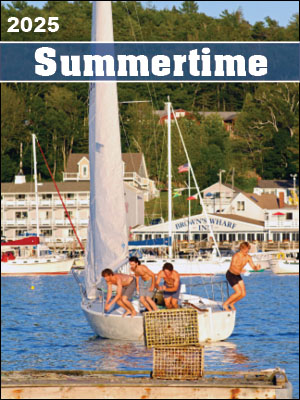Communities strengthen resilience through preparedness
 Southport Resilience Network member Kathy Jacobs, standing, takes community questions at the group’s Sept. 11 event. Photo by Sunrise Ecologic
Southport Resilience Network member Kathy Jacobs, standing, takes community questions at the group’s Sept. 11 event. Photo by Sunrise Ecologic
 Boothbay Region Climate Action Team chair Louise Cowan, standing left, speaks to Boothbay and Boothbay Harbor residents before a Sept. 16 talk from Boothbay Region Emergency Management Director John Oakes. Photo by Sunrise Ecologic
Boothbay Region Climate Action Team chair Louise Cowan, standing left, speaks to Boothbay and Boothbay Harbor residents before a Sept. 16 talk from Boothbay Region Emergency Management Director John Oakes. Photo by Sunrise Ecologic
 Southport Resilience Network member Kathy Jacobs, standing, takes community questions at the group’s Sept. 11 event. Photo by Sunrise Ecologic
Southport Resilience Network member Kathy Jacobs, standing, takes community questions at the group’s Sept. 11 event. Photo by Sunrise Ecologic
 Boothbay Region Climate Action Team chair Louise Cowan, standing left, speaks to Boothbay and Boothbay Harbor residents before a Sept. 16 talk from Boothbay Region Emergency Management Director John Oakes. Photo by Sunrise Ecologic
Boothbay Region Climate Action Team chair Louise Cowan, standing left, speaks to Boothbay and Boothbay Harbor residents before a Sept. 16 talk from Boothbay Region Emergency Management Director John Oakes. Photo by Sunrise Ecologic
This September, National Preparedness Month, residents from across the Boothbay region gathered to explore working together to stay safe during emergencies. With support from the state, partners, Sunrise Ecologic, and volunteer groups, local towns are assessing the impact of extreme storms, flooding, fires, and other threats linked to climate change. These efforts supported the towns’ Climate Impact Vulnerability Assessments, which highlight planning and coordination as a priority for resilience.
In Southport, people look out for each other. That was an underlying theme during a meeting with the Southport Resilience Network (SRN) Sept. 11. Around 40 residents joined to hear about updates to the town’s vulnerability assessment and efforts to strengthen disaster response. Since starting in 2023, the team and town have worked with Sunrise Ecologic to secure around $190,000 in grants for resilience work, including Hendrick’s Head Beach restoration.
“Although much of the work has been behind the scenes, we have accomplished a lot as a community over the last two years. We are now ready to launch a new organization, the Southport Resilience Network, to help promote emergency preparedness and manage risk across the Island," said presenter and Southport resident Kathy Jacobs.
From protecting vulnerable populations, safeguarding water supplies, to mitigating storm, fire, and flood risks, Jacobs said vulnerability assessment efforts have identified the community’s top climate-related concerns. However, she emphasized that many solutions depend on improving regional communication and coordination.
First responders on the island are prepared for emergencies, but not all residents know how to respond. Jacobs discussed efforts to develop a communications network to alert residents during an event. One possibility is a reverse 911 system, which uses a privacy-protected database of local contacts to pass on vital information. She also discussed creating a network of community leaders that could coordinate communications or door-to-door outreach.
“If you were raised on this island, you were taught to take care of your neighbors, so you should probably be doing that anyway,” said resident Sarah Sherman, highlighting existing community ties that could provide a foundation for a formal system.
Sept. 16, Boothbay and Boothbay Harbor residents learned about training that could help support such a community response. Hosted by the Boothbay Region Climate Action Team, Boothbay Region Emergency Management Director John Oakes gave a talk on emergency preparedness at the Boothbay Fire Station.
“Disasters always feel like they are far away, especially in Maine. But disasters can, and do, happen here,” he said. Oakes added that planning ahead, starting now, is key to safety. He shared tips for household preparedness and how to support professionals during an emergency.
Oakes said some of the biggest lessons from Hurricane Katrina were around how non-governmental groups reacted. He said there wasn't a plan for citizens to integrate efforts with first responders, which highlighted the need to train volunteers for joint efforts with government and local emergency responders.
In our region, neighbors who volunteer to take care of each other are a critical part of the disaster communication strategy. “When there's an emergency, people help, that's just the way it is,” he said.
Oakes said one way to prepare is through training with the Lincoln County Community Emergency Response Team (CERT). The program educates volunteers about local disaster preparedness and offers training in fire safety, team organization, medicine, and light search and rescue to support professionals.
“If you can take care of yourself, that takes the pressure off of first responders to deal with active situations,” Oakes said. “If you're keeping your family safe, if you're keeping your neighbors and your community safe, that's just less resources that have to go to those areas during a disaster.”
These efforts reflect a shared understanding that strengthening coordination now can make a difference when a disaster hits. Residents are encouraged to get involved by staying informed, volunteering, and building local networks. Disasters don't stop at your front door. Resilience is about working together to ensure your community is ready, connected, and strong.



























